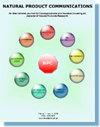Medicinal Plants as Effective Antiviral Agents and Their Potential Benefits
IF 1.4
4区 医学
Q4 CHEMISTRY, MEDICINAL
引用次数: 0
Abstract
This paper explores a diverse field of medicinal plants as potential antiviral agents, and delves into utilization of plant medicine for combating viral infections, emphasizing recent surge in research on natural products from plants as antiviral agents. Specific plant-derived compounds, like phyllanthin and iscador, have been proven to exhibit antiviral properties with great potential for pharmaceutical development. Mechanisms of antiviral action by phytochemicals that are present in medicinal plants, including direct viral inhibition, degradation of viral capsid, and immunomodulation were identified, and a combination therapy of medicinal plants with conventional antiviral drugs were explored. Efficacy of medicinal plants as antiviral agents was critically assessed and revealed that the complexity and variability of herbal formulations, and safety concerns regarding toxicity levels, pose challenges in drug development. However, research on medicinal plants is often hindered by limited understanding of phytochemical mechanisms, the complexity and variability of herbal formulations, and safety concerns regarding toxicity and interactions with other medications. The way forward in harnessing full potential of medicinal plants as antiviral agents underscores the need for further research into developing models that seek to enhance the selectivity of plant extracts in order to minimize toxicity levels.作为有效抗病毒剂的药用植物及其潜在益处
本文探讨了作为潜在抗病毒剂的药用植物的多个领域,并深入研究了利用植物药防治病毒感染的问题,同时强调了近期有关植物天然产品作为抗病毒剂的研究热潮。特定的植物提取物,如植物黄质和异黄质,已被证实具有抗病毒特性,在药物开发方面具有巨大潜力。研究发现了药用植物中的植物化学物质的抗病毒作用机制,包括直接抑制病毒、降解病毒外壳和免疫调节,并探索了药用植物与传统抗病毒药物的联合疗法。对药用植物作为抗病毒药物的疗效进行了严格评估,结果表明,草药配方的复杂性和多变性,以及对毒性水平的安全性担忧,给药物开发带来了挑战。然而,由于对植物化学机制的了解有限、草药配方的复杂性和多变性,以及对毒性和与其他药物相互作用的安全性的担忧,药用植物的研究往往受到阻碍。要充分挖掘药用植物作为抗病毒药物的潜力,就需要进一步研究开发相关模型,以提高植物提取物的选择性,从而最大限度地降低毒性水平。
本文章由计算机程序翻译,如有差异,请以英文原文为准。
求助全文
约1分钟内获得全文
求助全文
来源期刊

Natural Product Communications
工程技术-食品科技
CiteScore
3.10
自引率
11.10%
发文量
254
审稿时长
2.7 months
期刊介绍:
Natural Product Communications is a peer reviewed, open access journal studying all aspects of natural products, including isolation, characterization, spectroscopic properties, biological activities, synthesis, structure-activity, biotransformation, biosynthesis, tissue culture and fermentation. It covers the full breadth of chemistry, biochemistry, biotechnology, pharmacology, and chemical ecology of natural products.
Natural Product Communications is a peer reviewed, open access journal studying all aspects of natural products, including isolation, characterization, spectroscopic properties, biological activities, synthesis, structure-activity, biotransformation, biosynthesis, tissue culture and fermentation. It covers the full breadth of chemistry, biochemistry, biotechnology, pharmacology, and chemical ecology of natural products.
Natural Product Communications is a peer reviewed, open access journal studying all aspects of natural products, including isolation, characterization, spectroscopic properties, biological activities, synthesis, structure-activity, biotransformation, biosynthesis, tissue culture and fermentation. It covers the full breadth of chemistry, biochemistry, biotechnology, pharmacology, and chemical ecology of natural products.
 求助内容:
求助内容: 应助结果提醒方式:
应助结果提醒方式:


